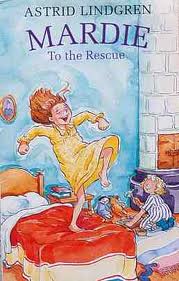Mardie to the Rescue
 Mardie to the Rescue (Madicken och Junibackens Pims, 1976, translated by Patricia Crampton) is the second book about Mardie, which apparently was never released in the United States. Pictures are by Ilon Wikland. No surprise — they’re great.
Mardie to the Rescue (Madicken och Junibackens Pims, 1976, translated by Patricia Crampton) is the second book about Mardie, which apparently was never released in the United States. Pictures are by Ilon Wikland. No surprise — they’re great.
The first Mardie book is a little more whimsical, but I love this book a little more because Astrid Lindgren was not afraid to discuss uncomfortable topics:
- Mardie’s mother suffers from depression. “She’s just lying down, feeling sorry for herself.” Mardie gave a sigh of relief. Mama did feel sorry for herself from time to time, but it passed over quite soon.
- Mr Nilsson is an alcoholic: “He never does anything but compeltate and flossifize! Was he sober?”
“Yes, I think so,” said Mardie uncertainly.
“I don’t think so,” said Mrs. Nilsson. - Mr. Lindson has mental disorder and lives in the poorhouse and attacks Lisbet.
- Mattie and Mia live in poverty.
- The elite make the rules and scorn the working class, such as Mardie’s beloved Alma.
Mardie is one of the only children (maybe the only child) Lindgren wrote about who was clearly from an upper-class family. She has a dressmaker, live-in help, modest political power due to her father’s job, and lives a much more comfortable life than her friends Abe and Mattie.
Despite being comparatively rich, Mardie in this book blossoms as a generous and caring young girl. Because of her, Mattie and Mia get de-loused, Abe has the chance to fly, and Abe’s mother sleeps easier at night after Mardie pays off the doctor. She also includes Lisbet in so many adventures, and their relationship blossoms.
If I could have a sister out of all the characters in Astrid Lindgren’s books, I would pick Lisbet (oh, maybe Tjorven, maybe it’s a tie). For example, this scene makes me laugh: What Lisbet could not understand was why she not in all the pictures, when Mardie had been one and two years old. “You couldn’t be there, because you weren’t born, there wasn’t any Lisbet in the whole of Junedale,” said Mardie. “There wasn’t any you then.”
“Silly thing, of course there was me,” said Lisbet. “But I didn’t want to sit next to a nasty child like you. I was at the sweetshop buying sweets.”
Lisbet also collects bad words and climbs into the wardrobe to say them to herself.
But there are also moments of seriousness: The fire and the song and the Spring dusk, oh, how could it be so beautiful and so splendid and so sad? Mardie was full to bursting with something she could not quite put a name to. Something which had no name. Yes, of course, it was life itself she felt, but it was something more as well.
And this line: Imagine anything so wonderful being really true!